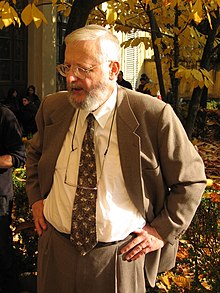F. W. Lawvere
| F. William Lawvere | |
|---|---|

Ramifications of Category Theory (Firenze, November 2003)
|
|
| Born |
February 9, 1937 Muncie, Indiana |
| Nationality | United States |
| Alma mater | Columbia University |
| Known for | Contributions to topos theory and philosophy of mathematics Lawvere theory |
| Awards | Premio Giulio Preti, awarded by the Consiglio regionale della Toscana in 2010 |
| Scientific career | |
| Fields | Mathematics |
| Institutions | SUNY-Buffalo |
| Doctoral advisor | Samuel Eilenberg |
| Doctoral students | Marta Bunge Emilio Faro-Rivas Anders Kock Xiao-Qing Meng Philip Mulry Jack Reichman Kimmo Rosenthal Michael Roy Michel Thiébaud |
Francis William Lawvere (/ˈlɔːvɪər/; born February 9, 1937) is a mathematician known for his work in category theory, topos theory and the philosophy of mathematics.
Lawvere studied continuum mechanics as an undergraduate with Clifford Truesdell. He learned of category theory while teaching a course on functional analysis for Truesdell, specifically from a problem in John L. Kelley's textbook General Topology. Lawvere found it a promising framework for simple rigorous axioms for the physical ideas of Truesdell and Walter Noll. Truesdell supported Lawvere's application to study further with Samuel Eilenberg, a founder of category theory, at Columbia University in 1960.
Before completing the Ph.D. Lawvere spent a year in Berkeley as an informal student of model theory and set theory, following lectures by Alfred Tarski and Dana Scott. In his first teaching position at Reed College he was instructed to devise courses in calculus and abstract algebra from a foundational perspective. He tried to use the then current axiomatic set theory but found it unworkable for undergraduates, so he instead developed the first axioms for the more relevant composition of mappings of sets. He later streamlined those axioms into the Elementary Theory of the Category of Sets (1964) (Reprints, #11) which became an ingredient (the constant case) of elementary topos theory.
...
Wikipedia
